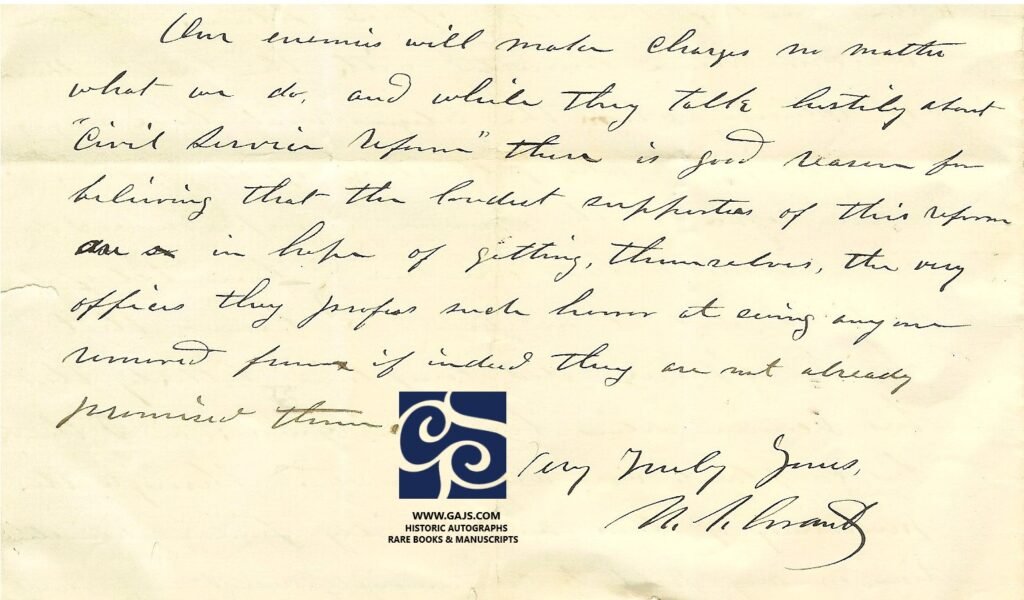ULYSSES S. GRANT
AN OUTSTANDING AND LENGTHY PRESIDENTIAL AUTOGRAPH LETTER SIGNED, DEFENDING HIS CIVIL SERVICE REFORMS
“THE CRY AGAINST THEM IS ENTIRELY FROM PEOPLE WHO WISH TO BREAK DOWN THE ADMINISTRATION, AND WHO WOULD PREFER SEEING THIEVES AND RASCALS IN THE IMPORT OFFICES TO GOOD MEN; MEN WHO WOULD PREFER REAL GRIEVANCES TO IMAGINARY ONES IF THEY COULD HAVE THEM, BUT WHO WILL ATTACK BY FALSEHOOD WHEN THE TRUTH DOES NOT SUIT THEIR PURPOSE..”
“OUR ENEMIES WILL MAKE CHARGES NO MATTER WHAT WE DO, AND WHILE THEY TALK LUSTILY ABOUT ‘CIVIL SERVICE REFORM’ THERE IS GOOD REASON FOR BELIEVING THAT THE LOUDEST SUPPORTERS OF THIS REFORM ARE IN HOPE OF GETTING, THEMSELVES, THE VERY OFFICES THEY PROFESS SUCH HORROR AT SEEING ANYONE REMOVED FROM IF INDEED THEY ARE NOT ALREADY PROMISED THEM. VERY TRULY YOURS, U.S. GRANT”
GRANT, ULYSSES S. (1822-1885). Union General and Eighteenth President of the United States. Excellent, important, and lengthy Autograph Letter Signed, as President. Four very full pages, quarto. “Long Branch, N[ew] J[ersey] / July 11th 1872.”
To: Geo[rge] W[ashington] Curtis. (1824-1892). The American writer who spoke in favor of African-American equality and civil rights before and after the Civil War; in 1871 he was appointed, by Grant, to chair the commission on the reform of the civil service; its report was the foundation of every effort since made for the reform and regulation of the service and for the attempt at the destruction of political patronage in government office.
Grant clearly defends and illuminates the positions and actions he has taken as President in Civil Service reform, by writing:
“Dear Sir: I am in receipt of your letter of the 7th of July making inquiries generally as to the manner of carrying out the rules established for the reform of the Civil Service of the Govt. I answer first, that I endeavor to carry out those rules as strictly as possible. In some instances it seems impossible to carry them out strictly in all their parts; but in no instance, according to my best memory, has a removal been made from office except in accordance with those rules; that is, causes other than political have existed. – In the case of the Galveston post office, if my memory serves me correctly, the last incumbent had been twice removed, once, or both times, before the adoption of the Civil Service rules; but owing to the division that has always existed between the Texas senators no one could be confirmed. After the adjournment of Congress Senator Flannagan with others from the state of Texas, asked me to appoint Clarke, and I did it.
I wanted the man out who was filling the office. It takes the Senate to confirm my action and if that body will not aid in placing in office such as I name they cannot be put in.
As to the retention of Mr. Casey, and Packard it was at the instance of the mass of the people directly interested that they were retained. Both fill their offices well and to the best interest of the whole government. The cry against them is entirely from people who wish to break down the Administration, and who would prefer seeing thieves and rascals in the import offices to good men; men who would prefer real grievances to imaginary ones if they could have them, but who will attack by falsehood when the truth does not suit their purpose. I do not pretend that good men have not been deceived by the clamor of these men and really think that both Packard and Casey should be relieved from their present position. The rules of the Civil Service really demand the retention of these two officers. – The Collector of Chicago was not removed. He resigned. His place was filled by the only man who was suggested for it, a man well known to the country, one who has served several times in Congress and who has represented this country at the Court of Berlin. No report of a board could add to the country’s knowledge of his fitness. There was no man connected with the Custom House of Chicago whom the citizens would have recognized as qualified to take full charge of the office.
In regard to the Spencer correspondence, I do not recollect to have ever seen or heard tell of it until I saw it in print. I know that Senator Spencer did complain bitterly that his recommendations had been ignored; and I think his complaints were well founded. Through the persistency of others, and possibly from a disinclination on my part to continuously resist importunities, I did him an Injustice which was foreign to my feelings towards any man entrusted by his constituents with so important a position as that of United States Senator.
There will constantly arise necessities for putting in places of trust men of known fitness and standing, without regard to any other rule than the confidence of the public in them; but I shall endeavor, have endeavored, to make no removals of me from office solely on political grounds.
Our enemies will make charges no matter what we do, and while they talk lustily about ‘Civil Service Reform’ there is good reason for believing that the loudest supporters of this reform are in hope of getting, themselves, the very offices they Profess such horror at seeing anyone removed from if indeed they are not already promised them. Very truly yours, U.S. Grant”.
Over the last 5+ decades we have handled many important Grant letters, but in terms of having him defend and enunciate his Presidential positioning in Civil Service Reform, none have even come close to this letter. Just an outstanding Grant letter, worthy of inclusion in the finest of Presidential collections, and clearly deserving to be: One of our “Best of the Best”.™
$18,500.00
